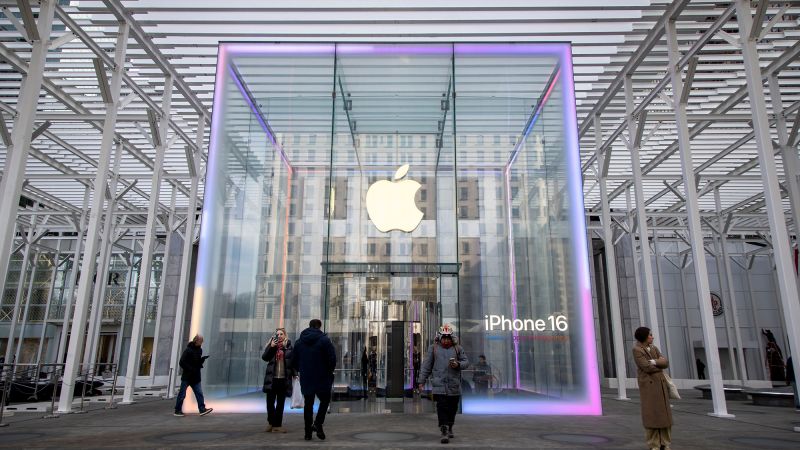The discourse surrounding Apple’s ventures into artificial intelligence (AI) has generated considerable scrutiny in tech and financial circles. The company’s ambitious announcements, particularly the unveiling of an AI-enhanced Siri during a June event, followed by delays in its rollout, has led to a chorus of criticisms. Many features deemed subpar, like text message summaries, have been caricatured as barely helpful, igniting a narrative that Apple is stumbling in a domain where it once excelled.
Critics argue that Apple’s sluggish progress may indicate a larger issue at play. While the backlash to the AI launch might seem justified, it masks a fundamental misunderstanding of the technological landscape. The prevailing notion is that Apple, alongside its contemporaries, is racing to integrate AI into its offerings to stay relevant amidst a marketplace that is continuously evolving. However, the pressing questions remain: What specific problems does this technology address? Are consumers genuinely clamoring for these advancements? The reality is that the consumer reaction to Apple’s AI initiatives has not been overwhelmingly positive—many have expressed apathy or skepticism, leading to the retraction of a prior ad due to consumer backlash.
At the core of this narrative is a different dynamic at play. A significant factor driving tech companies, including Apple, toward AI integration is not necessarily consumer demand but rather the insistence of Wall Street investors. Over the years, stockholders have longed for an “Apple super cycle”—a phenomenon where a major product upgrade prompts consumers to rush out and purchase the latest models, thereby driving profits to new heights. In their eagerness to satisfy shareholder expectations, Apple has faced missteps, ultimately conceding that some of its AI features will be postponed, hinting at a timeline for release in the upcoming year.
Despite these setbacks, the speculation that Apple is lagging in the AI race has taken on a life of its own. This discourse can sometimes lead to a foundational misconception: the idea that AI itself is faultless and any failures are attributed to human missteps. This viewpoint echoes a common adage in political circles: “The party can never fail; it can only be failed.” In this analogy, supporters of AI may inadvertently level blame at consumers for not understanding or adopting the technology as rapidly as expected.
Tech commentators, including Kevin Roose from The New York Times, have proffered perspectives suggesting that Apple has fallen short of evolving alongside AI advancements. Roose claims that Apple must embrace a more experimental ethos when deploying generative AI, accepting that imperfections are part of innovation. However, there remains considerable pushback on this viewpoint, questioning whether products should be launched while still in a curing phase.
Apple’s reputation has been built upon meticulous craftsmanship and consumer-oriented design. Founded by the detail-focused Steve Jobs, the Apple ecosystem represents one of the most rigorously controlled corporate identities internationally. Apple’s “walled garden” approach may evoke criticism, yet it has fostered a significant level of consumer trust, particularly regarding personal data security and privacy. This trust translates into user satisfaction with effortless product setups and seamless integrations across devices.
Further complicating the narrative, Roose posits that the responsibility lies with consumers to navigate the nuances of interacting with AI effectively. The implication that everyday users should train themselves to accommodate the limitations of AI models might be unrealistic, as it overlooks the essential need for technology to be user-friendly and accessible.
As acknowledged during discussions on platforms like the Hard Fork podcast, the rush to incorporate premature AI capabilities could yield lackluster products. Other tech giants, like Google and Amazon, have pushed similar AI features without seeing substantial consumer enthusiasm. The reality, as pointed out by co-host Casey Newton, is that AI remains largely experimental, characterized more by research intrigue than by established market applications. The potential of AI is indeed substantial, yet its current delivery often misses the mark in terms of utility.
Reflecting on Apple’s hypothetical new Siri capabilities illustrates this gap perfectly. While an AI-enhanced voice assistant could theoretically transform time management tasks, such as tracking a loved one’s flight, the stakes are high. If its accuracy falters even slightly, the consequences could lead to significantly negative experiences for users, making the features effectively unusable.
In conclusion, the critique surrounding Apple’s foray into AI is perhaps misplaced. It is not Apple that is lagging but rather the current landscape of AI capabilities. The essence of the technology still requires refinement and reliability before it can fulfill consumer expectations. Only then can the potential of artificial intelligence be recognized and embraced fully by the market.










